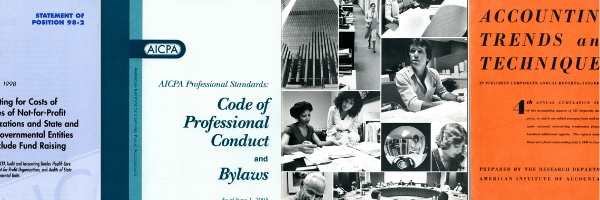
Exposure Drafts, Comment Letters, and Statements of Position
Files
Download Full Text (365 KB)
Description
It was apparent to the Task Force that its initial task was to evaluate and attempt to perceive the public interest and the changes that may have occurred in it. This included consideration of the positions and statements of various consumer groups as they could be ascertained by the Task Force. In the course of its deliberations the Task Force considered actions such as that by the Federal Trade Commission against the American Medical Association, the Justice Department against the American Bar Association and investigation of the AICPA by both these regulatory bodies. It also considered the Supreme Court decision in the Goldfarb and later Bates cases, a proposed model code of ethics developed by the National Association of State Boards of Accountancy and recent changes that had been made in existing regulations of various state boards of accountancy. The Task Force considered and rejected many of the traditional arguments against advertising. It believes that the competence and quality of professional accounting services are not necessarily enhanced by the prohibition against advertising. The Task Force concluded that the public has a paramount interest in a free flow of information concerning the availability of accounting services and that the flow of information should only be curtailed when there are counterbalancing public interests involved. For example, if certain information would tend to deceive or mislead the public, it should be prohibited. The Task Force concluded that the type of media used in advertising was of secondary importance. The Task Force concluded that the paramount need of the public is for information and that in this respect the public interest has changed since the AICPA rule on advertising was originally adopted. The Task Force believes the need for information is genuine and that the earlier need to shield the public in this regard is now of less importance. There was concern by the Task Force that the credibility and dignity of the CPA profession could be diminished by advertising. Consideration was given to whether removal of restrictions on advertising would erode the CPA's independence in the eyes of the public. On balance, the Task Force believes that the credibility and dignity of the profession would not be better served by retaining restrictions against advertising. In sum, the Task Force believes that advertising which is truthful and not misleading or deceptive should be permitted. It believes that false, misleading or deceptive advertising by members should be prohibited. Violations of these rules should be investigated and punished where they occur.
Publication Date
1977
Relational Format
Book
Keywords
Advertising -- Accountants; Accountants -- Professional ethics -- Standards -- United States
Disciplines
Accounting | Taxation
Recommended Citation
American Institute of Certified Public Accountants. Task Force on Advertising, "Proposed new rule 502 passed by AICPA Council 9/17/77 (awaiting mail vote of AICPA membership); Exposure draft (American Institute of Certified Public Accountants), 1977, Sept. 28" (1977). Exposure Drafts, Comment Letters, and Statements of Position. 382.
https://egrove.olemiss.edu/aicpa_sop/382



Comments
Originally published by: American Institute of Certified Public Accountants; Copyright and permission to reprint held by: American Institute of Certified Public Accountants.